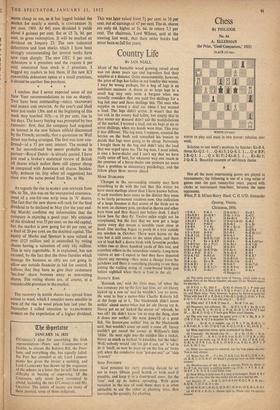Country Life
BY IAN NIALL
MOST of the burnable wood growing round about was cut down years ago and log-sellers find their supplies at a distance. Quite unaccountably, however, the price of logs has fallen in my locality this winter.
I may be wrong perhaps, for a bag of logs is an indefinite measure. A dozen or so large logs in a small bag may only seem a bargain when one casually considers that one paid five shillings for a bag last year and three shillings this. The man who supplies us turned a deaf ear when I last wanted a load. The logs didn't arrive. It wasn't that the last oak in the county had fallen, but simply that in that winter my demand didn't suit the manipulations of the market. I wanted a load, not six bags at six or seven shillings, when my hands were blue. This year it was different. The log man, I suppose, counted the berries on the bush and consulted his bunion to decide that logs were going to be cheap. Perversely I bought them by the bag and didn't take the load that was urged upon me. The log man, I must admit, is also a horse-dealer and I can't say that we have really come off best, for whatever way one reacts in the presence of a horse-dealer one presents no more than a problem in elementary psychology, and the fellow plays three moves ahead.
MORE STARLINGS
Changes in the surrounding country may have something to do with the fact that this winter we have more starlings about than I have known before. If such numbers have come to the district they seem to be fairly permanent residents now. One indication of a large invasion is that scores of the birds are to be seen on chimney pots, perched in thorns and other bare trees and they depart just before dusk. I don't know how far they fly. Twelve miles might not be exceptional, but the fact that we now get a large quota every day means a sizeable roost close at hand. One starling began to perch in a tree outside my window in., October. There were leaves on the tree but it still comes to the same place, and there are at least half a dozen birds with favourite perches within two or three hundred yards of this tree, and countless others in the immediate vicinity. Long-term visitors or not—I expect to find they have departed almost any morning—they make a change from the jackdaws and there is something pleasing to see them joining the trailing string of roost-bound birds just before nightfall when there is frost in the air.
DAVEY'S RIDE 'Reminds me,' said the little man, 'of when the bus company put up the fare last time, an' ole Davey
kicked up a row an' said he wouldn't 'ave no more. He went to buy a motor-bike Charlie Roberts left at the forge up at L. The blacksmith didn't know nothin' about motor-bikes but let ole Davey try it. Davey got on an' kicked the starter an' whoosh, he was off! He didn't know 'ow to stop the thing, slow it down nor nothin'. He went down'ill at a great lick. No licence,ono nothin' but, as the blacksmith said, that wouldn't come urs until 'e come off. Davey couldn't get round the corner at Williams's little 'oldin'. He went right into the midden like a rocket. Never as much as barked 'is knuckles, but the bike! Well, nobody would 'elp 'im get it out, an' e 'ad to do it 'isself, so now he pays up on the bus an' looks soft when the conductor says "put-put-put" an' olds 'is nose
SEED POTATOES
Seed potatoes for early planting should be set out in trays. Obtain good Scotch or Irish seed if possible, and keep it in a frost,proof store. Set the 'rose' end up to induce sprouting. With great variation in the size of seed these days it is often advisable to cut the tuber at planting time, thus increasing the quantity for planting.


































 Previous page
Previous page